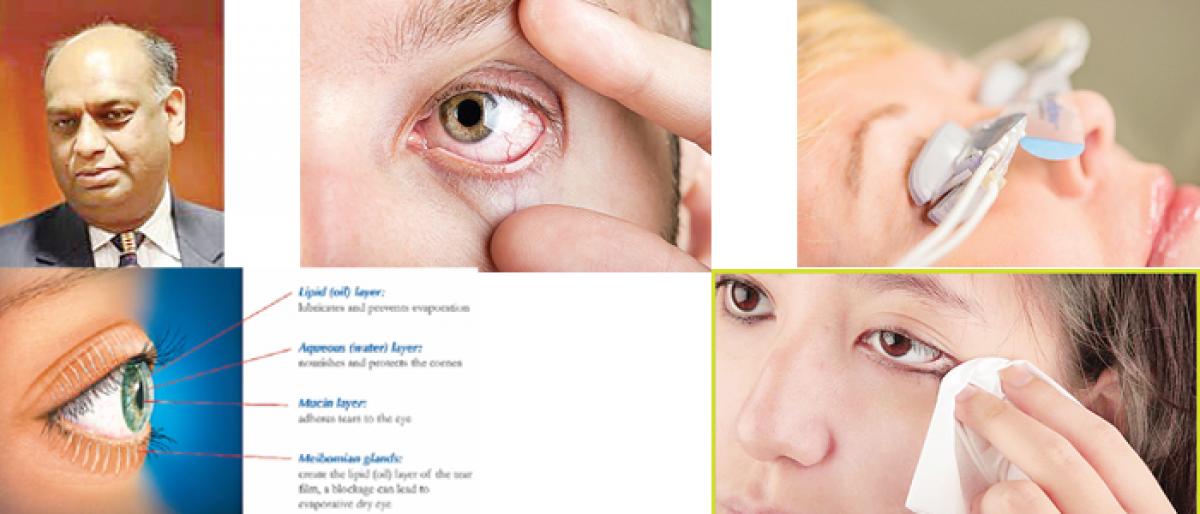Know all about ‘Dry Eye Syndrome’

Dry Eye Syndrome affects more than 100 million people around the world However, many people commonly dont know that they are suffering from dry eye syndrome
Dry Eye Syndrome affects more than 100 million people around the world. However, many people commonly don’t know that they are suffering from dry eye syndrome.
People come to ophthalmologists complaining of decreased vision, cataract or other eye related infections and are surprised to know that they have dry eye syndrome.
This is caused by inefficient tear production or excessive evaporation, causing mild discomfort like irritation, pain and feeling of something in eyes. If left untreated for long, may lead to increased risk of infection and visual impairment.
It is considered as a growing health issue which increases with age, so number of people affected by dry eye syndrome will increase in coming years as population ages. The condition thereby adversely affects employees’ productivity.
What is Dry Eye Syndrome?
Dry eye syndrome is a chronic insufficiency of moisture in the eye. Its consequences range from subtle but constant irritation to severe disturbance in day to day activity.
Tears moisten the eyes. They are much more than just water. They are a complex mixture of water, fatty oils, proteins, electrolytes, bacteria-fighting substances and growth factors.
This mixture helps make the surface of your eyes smooth and clear. Without it, good vision is impossible.
Treatment
For most people who have dry eyes, it’s a chronic condition. The goal of treatment is to make the symptoms as less as possible. Effective treatment begins with a careful examination to determine which factors may be causing your symptoms.
The goal of treatment is to keep your eyes moist. This can be done in a couple of ways. Artificial tears: These are lubricating eye drops that may reduce the dry, scratching feeling.
Preserving tears: This can be done by partially or completely closing the tear ducts, which normally serve to drain tears away. The closure conserves both your own tears and artificial tears you may have added.
Medications: Dry eyes caused by problems with the meibomian glands and blepharitis generally respond to specific treatment for the same.
Causes
Dry eye syndrome has several causes. For some people, the cause of dry eyes is an imbalance in the composition of their tears. In others its insufficient tears to keep the eyes comfortably lubricated. Medications and environmental factors also can lead to dry eyes.
The common causes for dry eye syndrome include
- Common cause is living in a dry, dusty or windy climate. >As a part of the natural aging process, especially during menopause.
- As a side effect of many medications, such as antihistamines, antidepressants, certain blood pressure medicines and birth control pills.
- Another cause is insufficient blinking, such as when you're staring at a computer screen all day.
- Dry eyes are also a symptom of systemic diseases such as lupus, rheumatoid arthritis, rosacea or Sjogren’s syndrome.
- Long-term contact lens wear is another cause.
- Certain eye conditions may cause eyes to feel dry and scratchy, like in blepharitis, an inflammation along the edge of the eyelids
Self-care helps
Simple care at home can make these patients feel better, like
Avoid direct air currents: Don’t direct hair dryers, car heaters, air conditioners or fans toward your eyes.
Wear protective glasses while going out: Good quality sunglasses protect eyes from the harsh UV radiations from falling directly into your eyes.
Use home humidifiers: In winter, a humidifier can add moisture to dry indoor air. Some people use specially designed glasses that form a moisture chamber around the eye, creating additional humidity.
Remember to blink: While working on computers, consciously blink. It helps spread your own tears more evenly.
Cold compresses: Gives soothing feeling to the patient with dry eyes.
(The writer is Medical Director at Center for Sight)











